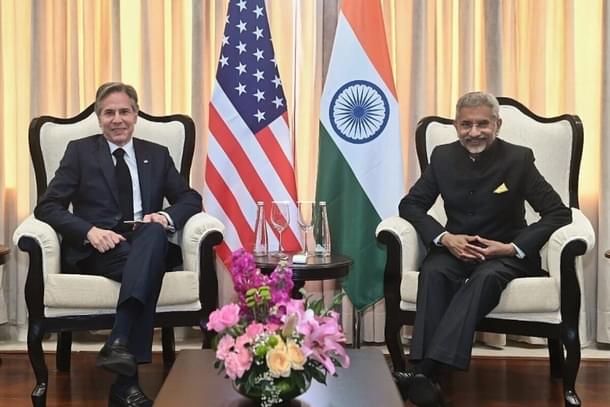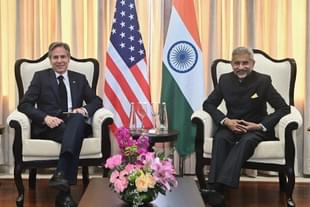World
Why India Needs To Tell The US To Lay Off The Upcoming Parliamentary Elections In Bangladesh
Jaideep Mazumdar
Oct 30, 2023, 04:45 PM | Updated 09:20 PM IST
Save & read from anywhere!
Bookmark stories for easy access on any device or the Swarajya app.


Bangladesh is headed for very difficult times, thanks to countrywide stirs launched by the opposition Bangladesh Nationalist Party (BNP) and its Islamist ally Jamaat-e-Islami in order to create chaos ahead of January’s parliamentary elections.
The chaos is being engineered by the BNP-Jamaat combine to attract intervention by some Western countries led by the USA.
The BNP-Jamaat combine, which has been out of power for the last 17 years, wants the Sheikh Hasina government to step down and make way for a caretaker government headed by the President to oversee the elections.
The two Opposition allies have been holding a series of demonstrations across the country over the past few months in support of its demand. It has been insisting that free and fair elections can only be possible under a caretaker regime.
But a mega rally called by the BNP Saturday (October 28) in Dhaka turned violent and resulted in the deaths of four persons, including a policeman.
The BNP’s calculation is that once the country descends into violence, the USA and some western nations which have been taking an active, though unwelcome, interest in the conduct of ‘free and fair polls’ in Bangladesh will get involved and force the Awami League government to resign.
What happened over the weekend
About one lakh people converged on Dhaka Saturday from all over the country for the BNP’s rally.
A section of the rallyists attacked some Awami League activists, leading to police intervention. That soon spiralled into a full-blown clash between cops and BNP activists who were armed with rods, hockey sticks and even machetes.
BNP activists, who were joined by Jamaat fundamentalists, attacked government installations, including the residence of the Chief Justice, and torched a few dozen vehicles. They also attacked and injured a dozen-odd journalists.
The police retaliated, firing tear gas canisters and ultimately broke up the rally in front of the BNP headquarters at Dhaka’s Nayapaltan where top party leaders were present.
The violence and widespread arson by BNP and Jamaat cadres led to the expected crackdown by the police. BNP Secretary General Mirza Fakrul Islam Alamgir was arrested on Sunday (October 29) morning.
The BNP called a countrywide ‘hartal’ Sunday to protest the arrest of Alamgir and hundreds of other BNP leaders and activists. The ‘hartal’ was also marked by violence and the deaths of three more persons in different parts of the country during clashes between BNP and Awami League (AL) activists.
The BNP-Jamaat have now called a three-day ‘rail-road-waterways blockade’ commencing Tuesday (October 31) to force the Sheikh Hasina government to step down.
With the Awami League and the government determined to foil the blockade and ensure normal movement of trains, vehicles and river vessels, the next few days are sure to see more violence.
Role of USA and some European nations
The USA and some European countries have, over the past few months, been taking a lot of interest in the conduct of parliamentary elections in Bangladesh.
The envoys of the USA and some European countries have been meeting top officials and politicians of the country and attempting to ‘guide’ the election process.
Senior US officials have also visited Bangladesh a number of times and issued statements calling for free and fair elections. The USA and some of its western allies have been pointing out that the elections need to be inclusive and the involvement of all Opposition parties needs to be ensured.
The USA has also started playing the role of the ‘global policeman’ by announcing punitive measures against individuals and organisations who it feels undermine the poll process in Bangladesh.
In September this year, the US State Department announced visa restrictions “on individuals undermining the democratic election process in Bangladesh”.
The USA has warned that not only will individuals, including politicians and members of law enforcement agencies, be penalised, the punitive measures will also apply to family members of the sanctioned individuals.
The USA and the EU have announced that they will deploy observers to oversee the elections and report actions by individuals and organisations who “undermine the election process”.
The interest shown by the USA and some European countries in the parliamentary elections has enthused the BNP-Jamaat who are keen on dislodging the Sheikh Hasina government.
BNP-Jamaat’s gameplan
The BNP-Jamaat, as alleged by the Awami League, wants to create acute disorder in the country. “Their objective is to ensure that Bangladesh descends into chaos. And once that happens, they will declare that free and fair elections cannot be held under the present government,” Awami League general secretary Obaidul Quader told Swarajya over phone from Dhaka.
The BNP-Jamaat will then announce a boycott of the elections if the Awami League government does not resign and make way for a caretaker regime to oversee the elections.
Many in the AL also feel that violence and chaos caused by the BNP-Jamaat may also embolden the US to demand that the ban on the Jamaat from participating in elections be lifted.
The dispute over caretaker government
All major political parties of Bangladesh demanded in 1990 that parliamentary elections in the country be held under a caretaker government composed of members of the judiciary and other prominent non-political persons appointed by the President.
This demand was part of a massive pro-democracy movement in the country led jointly by the AL and BNP that forced the resignation of the then military dictator General Hussain Muhammad Ershad.
Ershad had, in 1986, conducted parliamentary polls that were rigged. He emerged the winner in the elections that he conducted to legitimise his rule.
Fearing that the elections will be rigged again, the AL, BNP and other political parties demanded that the elections slated from 1991 be held under a caretaker government.
General Ershad, under tremendous international pressure, was forced to concede the demand before stepping down as the country’s executive president.
The parliamentary elections of 1991, 1996 and 2001 were held under caretaker regimes. The BNP came to power in 1991, the AL in 1996 and the BNP returned to power in 2001.
But things went awry in 2006 when a caretaker regime under the then Bangladesh President Iajuddin Ahmed took charge. The caretaker government was mandated to conduct elections and hand over power to the victorious party or alliance within 90 days.
But the army asserted itself and started functioning as an extra-Constitutional authority. It forced Ahmed to defer elections and, in the garb of cleansing the country’s fractious and corruption-ridden politics, effectively took over the reins of power.
The army replaced Ahmed by retired Justice Mohammad Fazlul Haque, who was deposed very soon and a former governor of Bangladesh’s central bank, Fakhruddin Ahmed, appointed in his place.
The army ruled the country through Fakhruddin Ahmed. But international pressure built up and the army was forced to announce elections in late 2008. The AL under Sheikh Hasina won that election.
The army-controlled caretaker government that was in power from October 2006 to early-January 2009 did carry out reforms, including the introduction of voter identity cards, and jailed many politicians accused of corruption.
But it continued for too long and ran into controversy when it tried to implement the ‘minus two’ formula that involved forcing the Awami League and the BNP to force their respective chairpersons (Sheikh Hasina and Khaleda Zia respectively) out of their positions and send them on exile out of the country.
The caretaker government system was abolished by the Awami League government through the 15th Constitutional Amendment in 2011.
The BNP protested the abolition and boycotted the 2014 and 2018 parliamentary elections because they were not held under neutral caretaker governments.
What India needs to do vis-a-vis the US
India has a lot at stake in the Bangladesh parliamentary elections. It is in India’s interest that the BNP and the Jamaat, both of which are avowedly anti-India and pro-Pakistan, are kept out of power.
Hindus in Bangladesh have faced horrific persecution whenever the BNP-Jamaat combine has been in power.
The Jamaat wants to impose Sharia laws in the country and reduce the status of all minorities, including the 1.3 crore Hindus, to that of second-class citizens.
If the BNP-Jamaat comes to power in Bangladesh, many bilateral connectivity, infrastructure, and other projects between India and Bangladesh will be rolled back. Also, China will be able to step up its involvement in Bangladesh and that will work against India’s interests.
Earlier BNP governments had allowed Pakistan’s notorious ISI free play in Bangladesh. A number of militant outfits of Northeast India were sheltered, financed and armed under BNP governments.
That is why India needs to tell the US to back off and stop interfering in the election process in Bangladesh. New Delhi must make it clear to Washington that further interference in the Bangladesh poll process will be considered an unfriendly act by India.
New Delhi must tell US officials that their country’s misplaced zeal to promote western-style democracy in Bangladesh may backfire and pave the way for a fundamentalist Islamist regime to come to power in the country.
There are examples of this having happened in other countries, most notably in Iraq and Syria. Also, such interference will push Bangladesh into China’s embrace and endanger regional security.
India has to impress upon the US that it is in Washington’s best interest that Sheikh Hasina continues to remain in power in Bangladesh.





